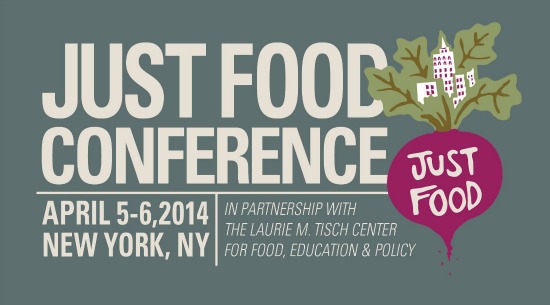
The annual Just Food Conference is coming up fast — April 5-6! — and we couldn’t be more excited about it. The event will bring food-loving community members together for two days of discussions, panels and intensive workshops about everything from how to best use your CSA share to how to get involved with a community garden. These and all of the other programs are slated to touch on Just Food’s main objective: building, supporting and engaging with the food systems around us, and mobilizing to make them better, increasing access to fresh, local, healthy food, especially for low-income communities.
“There’s something really neat about bringing together people from different aspects of the food world and to bring them together in one place,” said Amy Blankstein, grants and communications director for Just Food. The diversity of backgrounds and experiences that will be present at the conference allows for (and prompts) the wide range of topics that will be covered. “They really range — that’s one of things that’s really interesting about our conference. You can do a workshop on fermentation, on how to get into grassroots organizing and advocacy, or how to tell your story, or do urban agriculture workshops.”
The first day of the conference is packed with intensives: interactive and often hands-on workshops like a sheep butchery class (“Break it Down: Sheep”) and a seminar on revolutionizing school kitchens (“Harlem Grown’s Intro to Composting”). Blankstein wants for the intensives to inspire participants, teach them a new skill or help them feel connected to people who are as excited about food justice as they are. “I’m hoping for people to come out of the workshops feeling inspired and connected to other people in the movement. To come out reinvigorated — whether it’s for cooking or advocacy.”
Blankstein couldn’t choose an intensive she was most excited about (“They’re all so good!” she said), but narrowed it down to two she felt to be especially inspiring. “In terms of cooking, the ‘Cooking for Sustainability’ workshop is really cool,” she said, explaining that participants will learn how to implement mise en place technique in their own kitchen in order not only to make cooking easier and more appealing, but also to avoid wasting food. “The woman teaching the program, Ronna Welsh, has taken the ideas from the professional kitchen and adapted them to the home kitchen. The idea that there are so many elements of what you’re cooking that you might throw away or not get to — just trying to maximize what you have and make it approachable so that when you get home after a long day at work, everything is already organized and ready to go.”
Blankstein also recommended “From the Ground Up: Grassroots Organizing for Good Food Policy Change.” It’s “a good way for people to start engaging with advocacy work from the ground level,” she said, “how someone who shops at a farmers market or belongs to a CSA can get involved.”
Sunday will bring “the flipside of the advocacy intensives happening on Saturday”: panels of speakers that will include politicians, chefs and activists. Edible’s own Brian Halweil will be moderating “Beyond Farm to Table: Chefs and their Communities,” which will include a panel of chefs like Mary Cleaver of the Cleaver Company and George Weld of Egg, who, as Blankstein said, are not only “creating change in the ways that they source, but also going beyond by being activists for just food system.” Another panel, “Race in the Food System,” will allow for “a frank discussion of how race shapes our food system and how we can create change through advocacy.”
So much of the conference is about making connections, said Blankstein. “The conference is a really nice way for people to come together and dip into different subjects matters and get a sense of what’s going on in New York City in terms of community food projects, education, and food advocacy work.”



